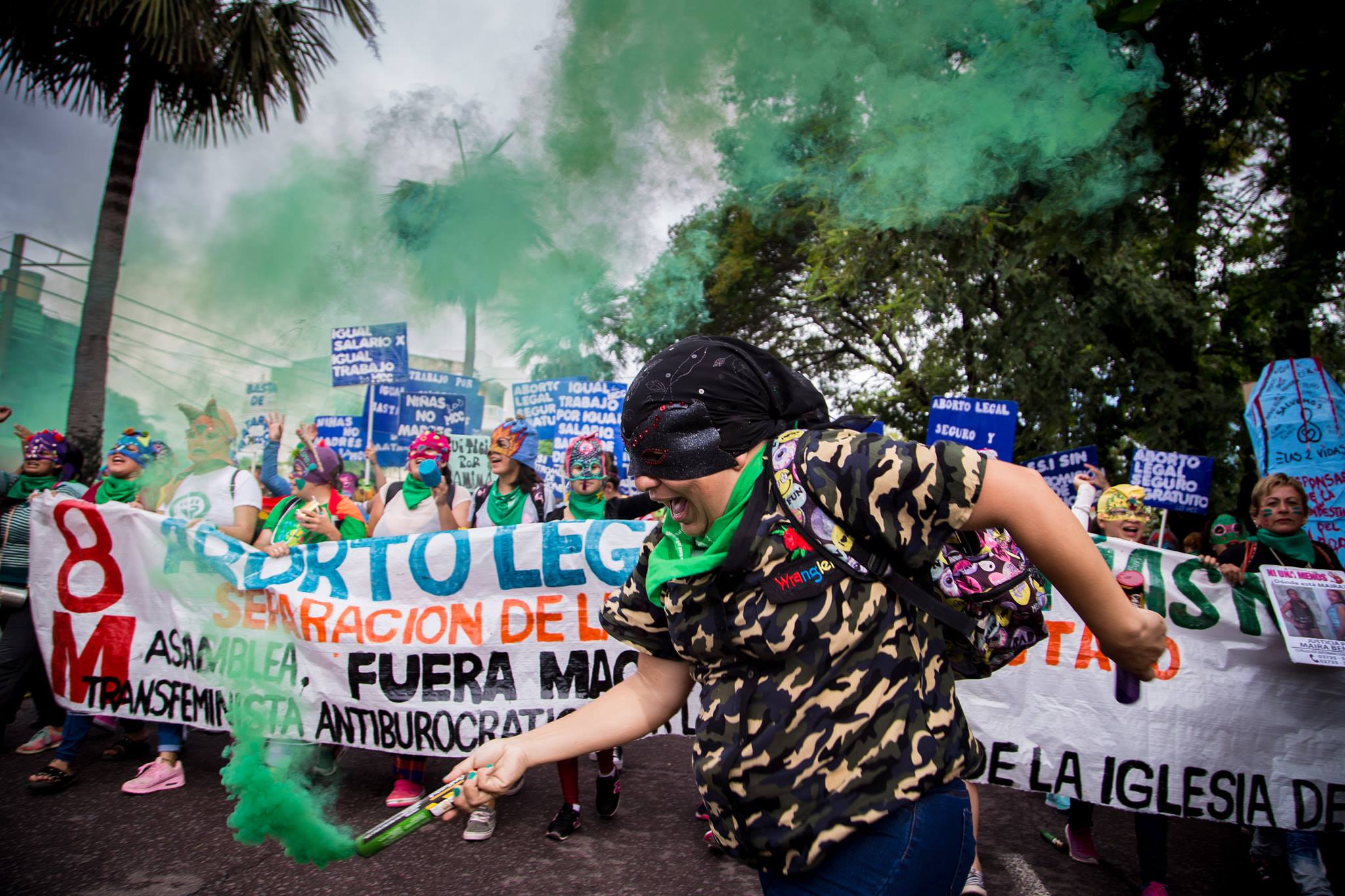All across the world, International Working Women’s Day was celebrated with marches, protests, and events to commemorate the historical struggles women have led for their political, economic, and social rights, as well as further the battle for their emancipation.
The day’s history goes back to more than a hundred years, with its beginnings in the fight for women’s suffrage. In 1917 Russia, on the 8th of March, a women’s protest against food shortages and war sparked the struggle leading to the October Revolution and the formation of the Soviet Union.
Women everywhere have carried forward the tradition of marking this day as one that celebrates their struggles and victories, with this year being no different.
In Zambia, women members of the Socialist Party marked the occasion by joining hands with their working class comrades to assist them in their labour of cleaning a local hospital.
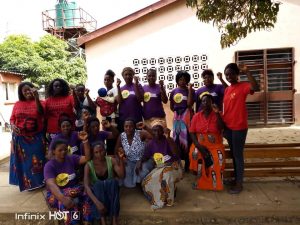
Across Latin America and the Caribbean, women, lesbians, travas, transvestis, transgender people, and gender diverse people took the streets in massive numbers to participate in the Feminist Strike denouncing machista violence evident in the alarming numbers of femicides across the continent, state indifference to this violence, the gendered pay gap, war and militarization, and the multiple forms of domination over women, travestis, trans and gender diverse people. Many also continued their demands for legal, safe and free abortion.
In Argentina, mobilizations were held in cities across the country. In the capital Buenos Aires, an estimated 300,000 marched from the National Congress to the Plaza de Mayo where a political declaration was read. The document states, “This 8M we strike because we are part of a collective and international history and because Macri and the austerity governors, with their capitalist and neoliberal violence, try and steal jobs, bread, health and education. After the green wave that drowned the streets and the plazas across Argentina and the world in 2018, we are organizing massively to demand that abortion finally be legal, safe and free. We strike because with the economic model of Mauricio Macri, the austerity governors along with the influence of the church, as women, lesbians, travestis, trans, non-binary, fat people and intersex people, we have no future”.
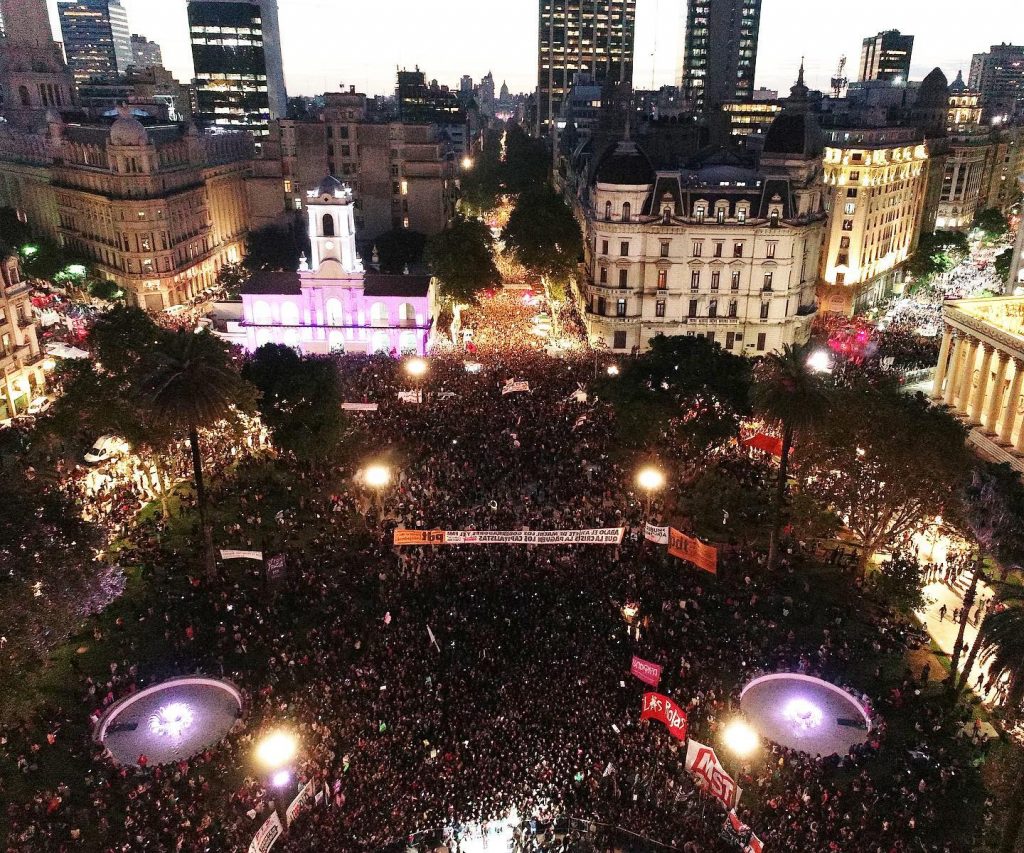
In Colombia, massive mobilizations and activities were held in country’s major cities like Bogotá Medellín and Cali, but one of the more interesting mobilizations was held in Santander de Quilichao. The social and political movements Congreso de los Pueblos (People’s Congress) and Procesos de Comunidades Negras (Black Communities’ Process) decided to hold their principle mobilization in Cauca, the department of the country most affected by the assassination of social leaders. The march-carnaval under the slogan “braiding for life, territories and peace” was held in the territories of Santander de Quilichao and sought to raise awareness to the high levels of gender-based violence, exclusion and aggressions suffered by women. In the mobilization they also voiced rejection of the assassination of social leaders, demanded that the Government respect the signed peace agreements and continue dialogues with the ELN, and expressed solidarity with the Venezuelan people against US imperialism.
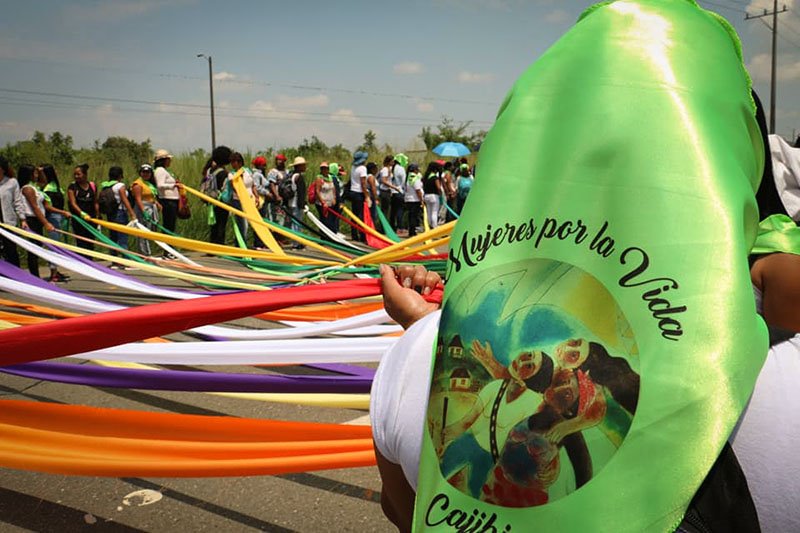
In Chile, an estimated 400,000 marched in the capital Santiago and across the country 400,000 participated in activities and marches. In the week leading up to the strike several actions were carried out to raise awareness and call people to mobilize. Monday March 4, was deemed #SuperFeministMonday and in a coordinated effort, feminist collectives and organizations renamed 43 metro stations to honor Chilean women activists and leaders, including militants who struggled against the brutal military dictatorship, Mapuche leaders whose struggle against colonialism continues today, as well as writers and cultural workers.

In El Salvador, the Feminist Strike came a day the liberation of three women who had been serving 30 year sentences for homicide after suffering spontaneous abortions. In El Salvador, abortion is completely prohibited and is criminalized, there are still 18 women incarcerated in the Central American country on similar charges. The liberation of the three women on Thursday was a result of the mobilization and struggle of feminists who have waged a strong battle demanding the liberation of all women who are incarcerated due to the strict anti-abortion laws, while also demanding that abortion be decriminalized and made legal. The joy at another feminist victory was reflected in the massive mobilization in the capital San Salvador where there were also strong denouncements of the machista and capitalist violence suffered by women in the country.

In Venezuela, in light of the imperialist attacks on the country which this weekend manifested in the sabotage and attacks to the central electrical grid which caused blackouts across the country, feminist organizations mobilized under the slogan “We struggle” to affirm their commitment to continue advancing in the struggle for their rights as a fundamental part of the Bolivarian Revolution.
Across the territories of Kurdistan, diverse activities and mobilizations were held to commemorate International Working Women’s Day. The guerrilla fighters of the Free Women’s Units (YJA Star) of Kurdistan held an activity in the Medya defense zone in the Qandil mountains of Iraqi Kurdistan. Zozan Cewlik, who is a member of the Military Council Mazlum Gabar spoke during the activity: “this spring is the source of resistance led by Leyla Güven,”. Güven is a Kurdish deputy who has been on a hunger strike for 121 days demanding the end to isolation of Kurdish leader Abdullah Öcalan who has been incarcerated for the past 20 years in the island-prison Imrali.

She remarked to the guerrilla fighters “We celebrate this March 8 for all of the comrades in the mountains of Kurdistan that salute this day with the same spirit and excitement, although we are physically separated. We salute the female guerrilla fighters of Northern Kurdistan, comrades in the defense zones of Medya and combatants of the YPJ, YJS and HPJ. We wish them success.”
The Women’s Protection Units-International who are part of the defense forces of Rojava issued a communique stating “we are conscious of our historical patrimony, as with the current historic situation. To fight as internationalist women and non-binary people in the ranks of the women’s auto-defense units of the YPJ in Rojava and the North East of Syria, we do not continue the patriarchal-capitalist idea of dividing people, disconnecting people and making them feel alone…We profoundly believe that we will liberate our gender, all of humanity and the whole world fighting shoulder to shoulder”.
Women’s day strike actions were organised in various cities across the United Kingdom.
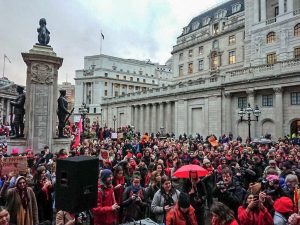

In London, Cardiff, Bristol, among other places, #MumsOnStrike events were organized to show the importance of domestic labour primarily carried out by women in keeping the capitalist production moving.
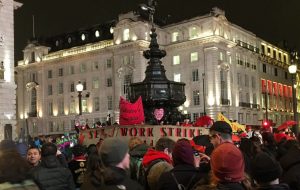
The rallies in London were also joined by striking sex workers, demanding decriminalisation of their work with the slogan, “Sex workers’ rights are human rights.”
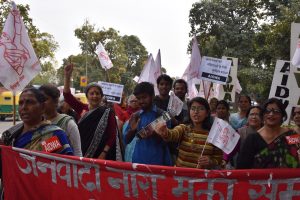
In India as well, sex workers’ organisations joined the rally consisting of different progressive organisations in the capital city New Delhi. Various marches and rallies were organised across the country.
APWLD is in #ChiangMai demanding rights of womem chanting when women stop, the world stops. #IWD2019 #InternationalWomenDay2019 #WomensGlobalStrike pic.twitter.com/fqNqjH2S9C
— APWLD (@apwld) March 8, 2019
In Chiang Mai, Thailand, the Asia Pacific Forum on Women, Law, and Development (APWLD) marched on the streets chanting the popular slogan, “When women stop, the world stops.” The organisation called for a global women’s strike next year.
In Cambodia, members of trade unions, people’s associations and civil society groups handed over a petition consisting of seven demands to the government after officials refused them permission to march in the city. The demands primarily called for strengthening measures to ensure safety of women in both workplaces and homes, and also called for protection from exploitation and conditions to make it easier for women to work, such as provision of “community preschools and day-care centers at the workplace”.
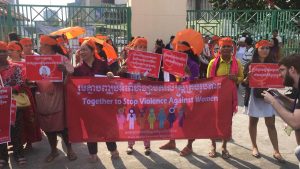
In Philippines, indigenous women led by Dumagat women organised a protest in Quezon city against the Metro Manila Water Sewerage System’s (MWSS) Kaliwa dam project. Remedios Marquez, an indigenous woman leader, said, “They have insisted to pursue the Kaliwa project on our ancestral domain. Our consent to this dam is like giving consent to submerge five barangays in Rizal, and another two in our province Quezon.”
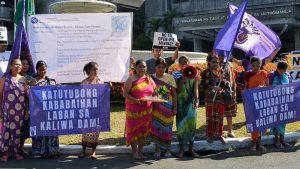
In Indonesia, IWD was commemorated on behalf of front Clara Maret Bergerak (Clamber/ Clara Moving Forward). An action was held in Gedung Sate, Bandung, March 8, 2019. A central banner read: “Moving out of oppression, realize alternative politics of women through true democracy!” The activists also reiterated their solidarity with the people’s struggles in West Papua, Pattani, Palestine and the Zapatista territories.
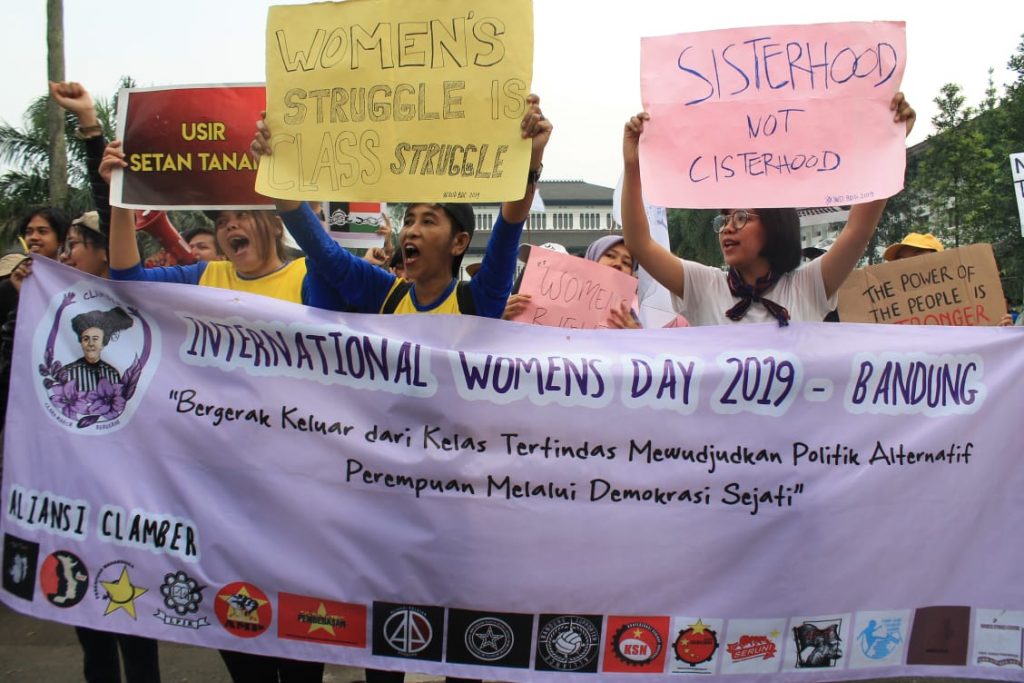
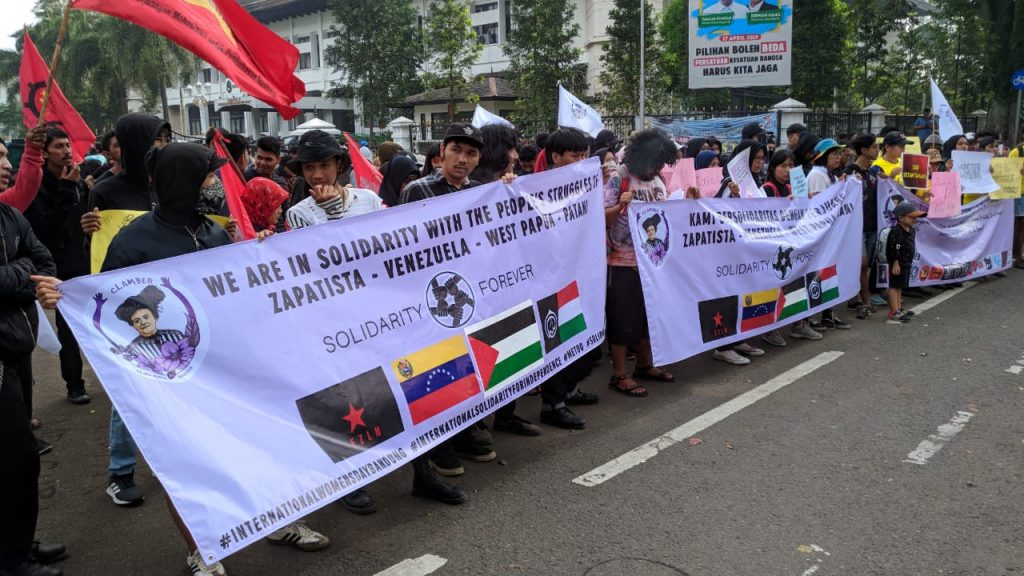
In Khal al-Ahmar, women gathered from across Palestine on March 6 to resist Israeli occupation efforts and mark International Women’s Day. The International Solidarity Movement (ISM) of Palestine said, “With the upcoming Israeli election, the extreme right in Israel are once again calling for the destruction of Khan al-Ahmar. Disgustingly, politicians are using cleansing and land theft in an attempt to gain votes from segments of Israeli society.

This event, held on the Wednesday before International Women’s Day is especially significant as it marks the first time for several months that a large group have been able to access Khan al-Ahmar.”
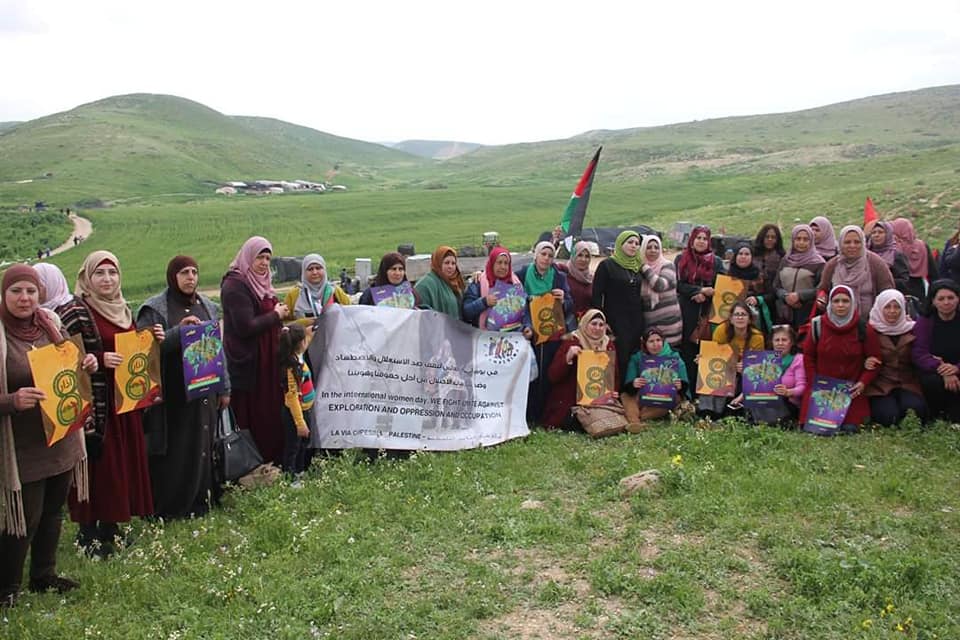
Members of La Via Campesina in Palestine also mobilised in solidarity with women across the world and against Israeli oppression.
The Awami Workers’ Party of Pakistan said in their statement, “On this International Working Women’s Day, let us resolve to re-summon the revolutionary and radical vision of the day’s origin, when socialist feminist leaders like Clara Zetkin called for the liberation of women amid a wholesale transformation of the economy, society and social relationships. As the world reels from the throes of patriarchal, fascist and militarist violence, we renew our call for a revolutionary struggle that centre’s women’s liberation in the battle against oppression & exploitation in all its forms.”
The International Trade Union Confederation (ITUC) emphasised on the need for safe workplaces for women, “Every woman should have the basic right to a working environment free from violence and harassment, whatever the form of her contractual relationship, whether she works in the formal or informal economy, or in a rural or urban setting.
An international labour law to address violence and harassment in the world of work is urgently needed. Such a law could transform working conditions for women by ensuring that violence is not part of the job.”
Some of the biggest mobilisations were seen all across the Spanish State. Hundreds of thousands of women came out on the streets of Madrid, Barcelona, and other cities and towns. Women also went on strikes, which were supported by the Spanish Socialist Workers Party (SPOE) government which said it will “reduce its institutional activity.”
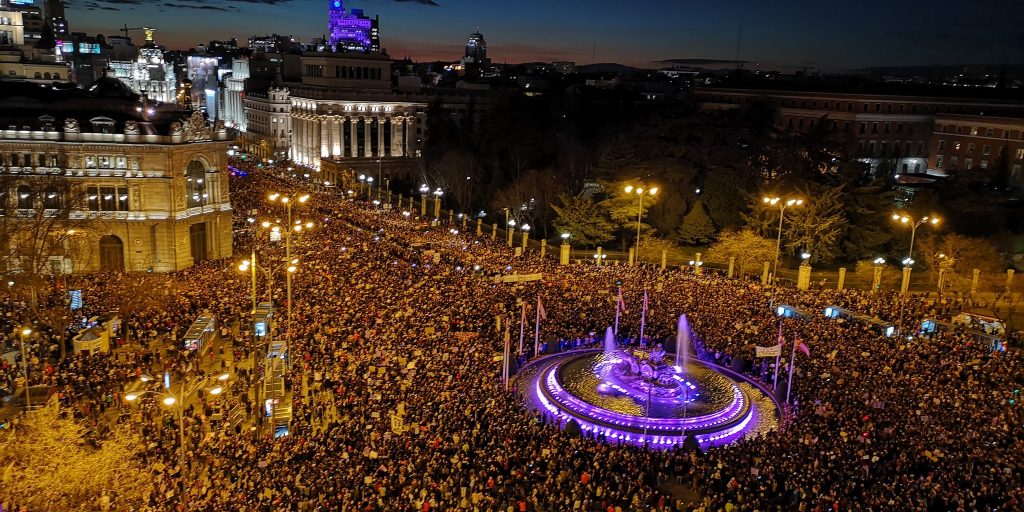
The Communist Party of Canada in its statement reminded readers of Marielle Franco’s life and struggles, “Marielle Franco, a gay Brazilian feminist, human rights activist and City Councillor was brutally murdered by police agents just days after last year’s IWD… Franco had the courage to stand up against the renewed fascist leadership in Brazil and her example gives hope to women and democracy supporters in Venezuela and across Latin America, who must now resist the possibility of a Brazilian-led and American-supported intervention in the region.”
The youth wing of the Communist Party of Canada also issued a statement, “While we must organize and struggle for the immediate demands of working-class women such as pay equity, we also recognize the insidious nature of the “perfect marriage” between capitalism and patriarchy. The Young Communist League of Canada calls for action against capitalism, against all forms of oppression against women, and calls to organize and fight back in our workplaces, universities and in the streets!”
The diverse and huge number of solidarity actions are a testament to women’s struggles’ past and future. They honour the rights women have achieved through centuries of resistance, and the fights they continue to fight for a more equal and just world.


